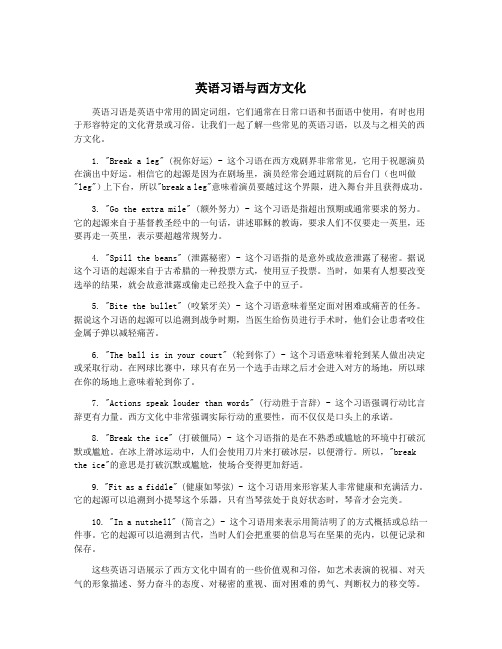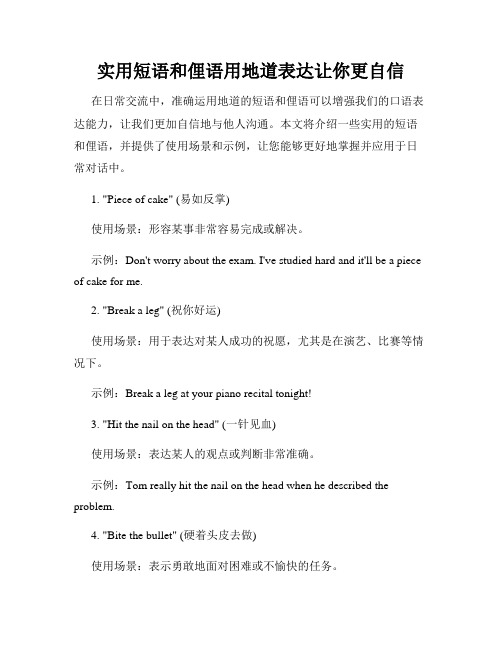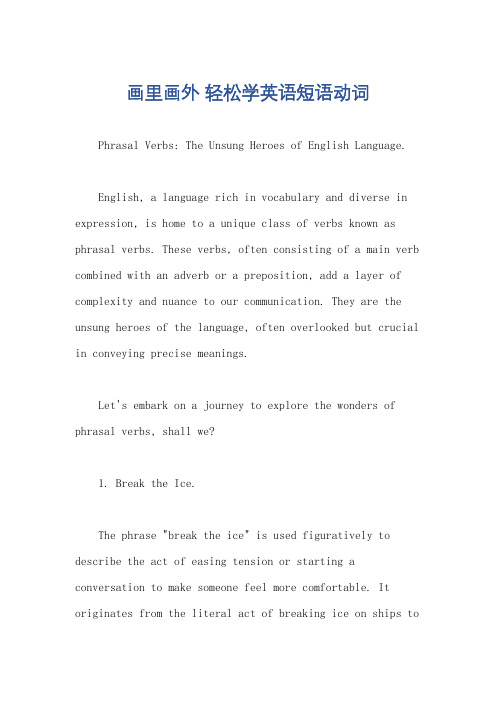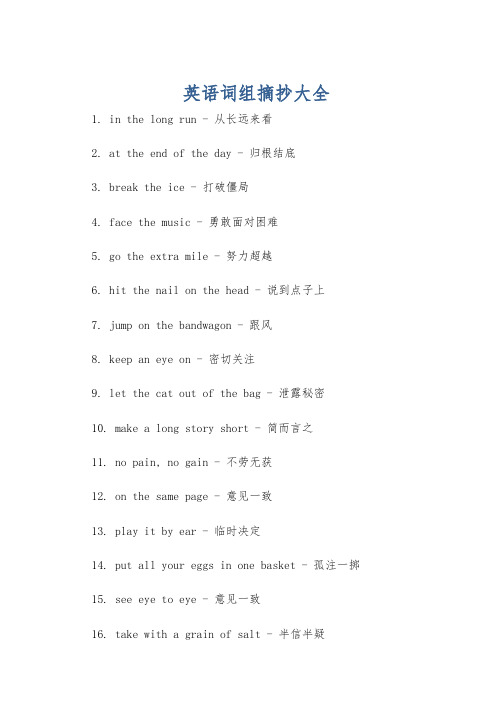英语成语 go the extra mile 的用法
英语习语与西方文化

英语习语与西方文化英语习语是英语中常用的固定词组,它们通常在日常口语和书面语中使用,有时也用于形容特定的文化背景或习俗。
让我们一起了解一些常见的英语习语,以及与之相关的西方文化。
1. "Break a leg" (祝你好运) - 这个习语在西方戏剧界非常常见,它用于祝愿演员在演出中好运。
相信它的起源是因为在剧场里,演员经常会通过剧院的后台门(也叫做"leg")上下台,所以"break a leg"意味着演员要越过这个界限,进入舞台并且获得成功。
3. "Go the extra mile" (额外努力) - 这个习语是指超出预期或通常要求的努力。
它的起源来自于基督教圣经中的一句话,讲述耶稣的教诲,要求人们不仅要走一英里,还要再走一英里,表示要超越常规努力。
4. "Spill the beans" (泄露秘密) - 这个习语指的是意外或故意泄露了秘密。
据说这个习语的起源来自于古希腊的一种投票方式,使用豆子投票。
当时,如果有人想要改变选举的结果,就会故意泄露或偷走已经投入盒子中的豆子。
5. "Bite the bullet" (咬紧牙关) - 这个习语意味着坚定面对困难或痛苦的任务。
据说这个习语的起源可以追溯到战争时期,当医生给伤员进行手术时,他们会让患者咬住金属子弹以减轻痛苦。
6. "The ball is in your court" (轮到你了) - 这个习语意味着轮到某人做出决定或采取行动。
在网球比赛中,球只有在另一个选手击球之后才会进入对方的场地,所以球在你的场地上意味着轮到你了。
7. "Actions speak louder than words" (行动胜于言辞) - 这个习语强调行动比言辞更有力量。
西方文化中非常强调实际行动的重要性,而不仅仅是口头上的承诺。
trick短语

trick短语随着全球化的发展和信息交流的加强,短语在现代英语中扮演着重要的角色。
熟练地运用短语可以使语言更加地流利和自然。
本文将通过介绍一些常见的“trick短语”来帮助读者更好地掌握英语中的短语用法。
一、拔高1. Hit the nail on the head这个短语指的是“说到点子上”或者“一拍即合”,在表达时可以用在很多情境中。
例如,当你的朋友提到一个问题,并且你非常赞同他/她的观点时,你可以回答,“You hit the nail on the head!"2. Blow one's mind“Blow one's mind”意思是“令人惊叹”或者“震撼”。
它通常用来形容某个事物非常出色或引人注目。
例如,“The special effects in that movie really blew my mind!”3. Go the extra mile这个短语表示“做更多的努力”或者“超出预期”。
当你想表达你愿意付出额外努力时,你可以说,“I'm willing to go the extra mile for this project.”二、讨论1. Beat around the bush这个短语指的是“拐弯抹角”或者“兜圈子”,用来形容某人讲话绕来绕去,没有直接点明要表达的意思。
例如,“Stop beating around the bush and tell me what you really think!”2. Get the hang of这个短语表示“掌握某物的要领”或者“理解某个概念”。
例如,“It took me a while, but I finally got the hang of playing guitar.”3. Wrap one's head around“Wrap one's head around”意思是“理解”或者“接受某个概念”。
英语一百句常用短语

英语一百句常用短语1. A piece of cake: Something that is very easy.2.Beat around the bush: Avoiding the main topic, not speaking directly or honestly.3.Cost an arm and a leg: Very expensive, costing a lot.4.Break the ice: To start a conversation in a social situation.5.Bite the bullet: To face a difficult situation with courage.6.Cutting corners: Doing something poorly to save time or money.7.Hit the nail on the head: Doing or saying something exactly right.8.Hit the hay: To go to bed or to go to sleep.9.It’s raining cats an d dogs: Raining heavily.10.Jump on the bandwagon: To join a popular trend or activity.11.Keep an eye on: To watch or take care of someone or something.12.Let the cat out of the bag: To reveal a secret.13.Piece of cake: Something that is easy to do.14.Put all your eggs in one basket: To make everything rely on one single thing.15.Raining cats and dogs: Raining heavily.16.Spill the beans: To reveal a secret.17.Take a rain check: To decline an invitation but suggest that you will accept it later.18.A dime a dozen: Something common and easy to get.19.Blessing in disguise: An apparent misfortune that eventually results in a good outcome.20.Break a leg: Good luck.21.Elbow grease: Hard physical work.22.Fish out of water: Someone who is out of place in a particular situation.23.Get your act together: To start making an effort to improve your behavior or work.24.Hold your horses: To wait and be patient.25.Let the cat out of the bag: To reveal a secret unintentionally.26.Spill the beans: To reveal a secret.27.Take a rain check: To decline an invitation, but suggest you will accept it another time.28.A picture is worth a thousand words: A visual portrayal can convey a complex idea more effectively than words.29.Better late than never: It is better to arrive late than not to come at all.30.Bite off more than you can chew: To take on a task that is way too big.31.Burn the midnight oil: To work late into the night.32.Cost an arm and a leg: To be very expensive.33.Don’t cry over spilt milk: Do not waste your time worrying about something that happened in the past.34.Every cloud has a silver lining: In every bad situation, there is a good aspect.35.Hold your horses: Used to tell someone to wait or be patient.36.Let the cat out of the bag: To reveal a secret.37.On the ball: To be very competent and efficient.38.Piece of cake: Something that is very easy.39.Spill the beans: To reveal a secret.40.Take it with a grain of salt: To not take something too seriously.41.Under the weather: Feeling unwell or sick.42.Actions speak louder than words: What you do is more important than what you say.43.As cool as a cucumber: To stay calm and composed.44.Bury the hatchet: To make peace with someone.45.Cut to the chase: Skip the preliminaries and get to the point.46.Don’t put all your eggs in one basket: Do not risk everything on a single venture.47.Every dog has its day: Everyone will have a chance to succeed at some point.48.Go the extra mile: Put extra effort into something.is causing a situation or problem.50.Jump on the bandwagon: Join a popular trend or activity.51.Kick the bucket: Pass away or die.52.Make a long story short: Summarize something briefly.53.No pain, no gain: You have to work hard to achievea goal or success.54.Piece of cake: Something that is very easy.55.Spill the beans: To reveal a secret.56.Take it with a grain of salt: Don’t take something too seriously.57.Under the weather: Feeling unwell or sick.58.Actions speak louder than words: What you do is more important than what you say.59.As cool as a cucumber: To stay calm and composed.60.Bury the hatchet: Make peace with someone.61.Cut to the chase: Get to the point without wasting time.62.Don’t put all your eggs in one basket: Do not risk everything on one venture.63.Every dog has its day: Everyone will have an opportunity to succeed at some point.64.Go the extra mile: Make an extra effort in something.causing a situation or problem.66.Jump on the bandwagon: Join a popular trend or activity.67.Kick the bucket: To pass away or die.68.Make a long story short: Summarize something briefly.69.No pain, no gain: You have to work hard to achievea goal or succeed.70.Piece of cake: Something that is very easy.71.Spill the beans: Reveal a secret.72.Take it with a grain of salt: Don’t believe something completely.73.Under the weather: Feeling unwell or sick.74.Actions speak louder than words: What you do is more important than what you say.75.As cool as a cucumber: Calm and composed.76.Bury the hatchet: Make peace with someone.77.Cut to the chase: Get to the main point.78.Don’t put all your eggs in one basket: Do not risk everything on one venture.79.Every cloud has a silver lining: Every bad situation has a good aspect.80.Go the extra mile: Put extra effort into something.81.Hit the nail on the head: Describe exactly what is causing a situation or problem.82.Jump on the bandwagon: Join a popular trend or activity.83.Kick the bucket: Pass away or die.84.Make a long story short: Summarize something briefly.85.No pain, no gain: You have to work hard to achieve success.86.Piece of cake: Something that is very easy to do.87.Spill the beans: Reveal a secret.88.Take it with a grain of salt: Don’t believe something completely.89.Under the weather: Feeling unwell or sick.90.Actions speak louder than words: What you do is more important than what you say.91.As cool as a cucumber: Calm and composed.92.Bury the hatchet: Make peace with someone.93.Cut to the chase: Get to the main point.94.Don’t put all your eggs in one basket: Do not risk everything on one venture.95.Every dog has its day: Everyone will have an opportunity to succeed.96.Go the extra mile: Put extra effort into something.97.Hit the nail on the head: Describe exactly what is causing a situation or problem.98.Jump on the bandwagon: Join a popular trend or activity.99.Kick the bucket: Pass away or die.100.Make a long story short: Summarize something briefly.。
实用短语和俚语用地道表达让你更自信

实用短语和俚语用地道表达让你更自信在日常交流中,准确运用地道的短语和俚语可以增强我们的口语表达能力,让我们更加自信地与他人沟通。
本文将介绍一些实用的短语和俚语,并提供了使用场景和示例,让您能够更好地掌握并应用于日常对话中。
1. "Piece of cake" (易如反掌)使用场景:形容某事非常容易完成或解决。
示例:Don't worry about the exam. I've studied hard and it'll be a piece of cake for me.2. "Break a leg" (祝你好运)使用场景:用于表达对某人成功的祝愿,尤其是在演艺、比赛等情况下。
示例:Break a leg at your piano recital tonight!3. "Hit the nail on the head" (一针见血)使用场景:表达某人的观点或判断非常准确。
示例:Tom really hit the nail on the head when he described the problem.4. "Bite the bullet" (硬着头皮去做)使用场景:表示勇敢地面对困难或不愉快的任务。
示例:I don't enjoy giving presentations, but I'll just have to bite the bullet and do it.5. "Get the hang of" (掌握,了解)使用场景:表示逐渐掌握某种技能或理解某个概念。
示例:It took me a while, but I finally got the hang of playing the guitar.6. "On the same page" (意见一致)使用场景:表示大家对某个问题或计划达成了一致意见。
《英语俚语、习语大全》

副标:掌握这些俚语、习语,将大大提高阅读与写作能力。
您就是否有过这样得体验,在读一篇英语文章或瞧一部美剧时,明明有些词都认识,但组合到一起后就完全不懂就是什么意思了,或者您理解到得那层意思并不就是它本身得意思,这就就是英语中俚语与习语得玄机所在了 .所以,要想读懂一篇文章,还需要攻克英语中常见得那些俚语与习语,现在让我们一起来学习下吧。
In the city I was nothing , but i n th e c o u n tr y I w as con s idereda b ig fish、在城里我并不就是什么大人物,但就是在乡下我被认为就是个了不起得人物。
For him, the wor k is a pie c e ofca ke、对她来说,这点活儿就就是小菜一碟。
My car barely started t his morning,and t o add i nsult t o inj ur y, I go t a f lat tire in th e d riveway、今天早上我得车差点没发动起来 ,雪上加霜得就是开到车道时一个车胎也没气了。
If y o u h ave a g o o d i d ea f o r i m p roving m y p r o nu n c iati o n, I’m all e a r s、如果您对改进我得发音有好得建议 ,我洗耳恭听。
Pe o p le s houl d b e d o wn—to-earth, in s tead o f being o v er—a m bitious、做人应该脚踏实地,不要好高骛远。
Don’t b e at around th e bush! T e l l me exactly what J ac k s aid、别拐弯抹角了!实话告诉我杰克说什么了。
Life is not a b e d of r o s es, but pl e ase t r e a s ure it and enjoy i t 、虽然生活不总就是一帆风顺 ,但就是请珍惜生活,享受生活T he house b i nes c o u ntry s urround i ngs wi t h city c o nv e n ien c e, so havingthe be s t of b o th wo r ld s、这所房子既有乡村得环境又有城市得便利,两全其美。
外贸展会常用短语

外贸展会常用短语1. “Hit the ground running”(立即全力以赴)Example: At the trade show, as soon as we set up our booth, we had tohit the ground running. There were so many potential customers coming our way. I was like, "Hey, we can't waste a second! Let's show them what we've got!" It's like being in a race where the starting gun has just fired, and you've got to dash forward without hesitation.2. “Break the ice”(打破僵局)Example: When a group of serious - looking foreign clients stopped at our booth, it was a bit awkward at first. So I decided to break the ice. I said with a big smile, "Hello! You know, this trade show is like a big party, and we're all here to have a great time and do some amazing business. How are you today?" It was just like smashing that cold wall between us and getting the conversation flowing.3. “Seal the deal”(达成交易)Example: After hours of talking and showing our products to a client, I could feel that we were close. I thought to myself, "This is it! We'reabout to seal the deal." I said to the client, "Look, we've offered you the best quality at a great price. It's like a golden opportunity for both of us. Let's make this happen." And just like that, we shook hands and madethe deal.4. “On the same page”(达成共识)Example: My colleague and I were talking to a foreign partner about a new project. At first, we seemed a bit all over the place. But then we sat down and really explained our ideas clearly. I said, "Hey, we need to be onthe same page here. It's like we're building a house together, we need to know exactly how we're going to do it." And finally, we all nodded and knew exactly what we were aiming for.5. “In the loop”(知情)Example: There were so many new product announcements at the trade show.I told my team, "We've got to keep everyone in the loop. If we don't, it's like we're driving a car blindfolded. We need to know all the latest news about our competitors and new trends so we can stay ahead." So we made sure to share every bit of information we got.6. “Think outside the box”(跳出固有思维模式)Example: Our booth design was looking a bit ordinary. My friend said, "We need to think outside the box here. This is a chance to really stand out." I was like, "You're right! It's not just about having a table and some brochures. It's like creating a whole new world for the customers to step into when they come to our booth." And then we came up with a really creative and unique booth design.7. “Go the extra mile”(加倍努力)Example: There was a really picky client at the trade show. Most people would have given up, but I thought, "I'm going to go the extra mile forthis one." I spent hours answering all his questions, showing him everylittle detail of our products. I said, "Look, I'm not just here to sell you something. I'm here to make sure you get exactly what you need. It's like climbing a mountain, and I'm not stopping until I reach the top with you."8. “Cut to the chase”(直入主题)Example: A foreign buyer was chatting with me, but he was going on and on about unimportant things. I finally said, "Hey, let's cut to the chase. We both know you're interested in our products. So let's talk about prices and quality." It was like cutting through all the fluff and getting to the real meat of the matter.9. “Make a splash”(引起轰动)Example: We had a new product to launch at the trade show. I told my team, "We need to make a splash with this. It's like we're throwing a big stone into a pond, and we want the ripples to be felt everywhere." So we planned a big, exciting presentation with lots of lights and music, andsure enough, people were flocking to our booth.10. “Read between the lines”(领会言外之意)Example: A potential partner was talking to us in a very diplomatic way.I whispered to my colleague, "We've got to read between the lines here. What's he really trying to say?" It's like trying to find the hidden message in a coded letter. So we paid really close attention to his toneand choice of words to figure out what he really wanted.。
画里画外 轻松学英语短语动词

画里画外轻松学英语短语动词Phrasal Verbs: The Unsung Heroes of English Language.English, a language rich in vocabulary and diverse in expression, is home to a unique class of verbs known as phrasal verbs. These verbs, often consisting of a main verb combined with an adverb or a preposition, add a layer of complexity and nuance to our communication. They are the unsung heroes of the language, often overlooked but crucial in conveying precise meanings.Let's embark on a journey to explore the wonders of phrasal verbs, shall we?1. Break the Ice.The phrase "break the ice" is used figuratively to describe the act of easing tension or starting a conversation to make someone feel more comfortable. It originates from the literal act of breaking ice on ships toallow them to move freely.Example: "At the party, John tried to break the ice by making a joke, but it fell flat."2. Carry the Day.To "carry the day" means to prevail or succeed, especially after a struggle or competition. It suggests overcoming obstacles to achieve a desired result.Example: "After a long and arduous debate, the motion to adopt the new policy carried the day."3. Cut to the Chase."Cutting to the chase" refers to getting straight to the point or the essential matter, bypassing any unnecessary preambles or introductions.Example: "I'm tired of all this small talk; let's cut to the chase and discuss the real issues at hand."4. Fall Through.When a plan or agreement "falls through," it means it fails to materialize or come to fruition. This can be due to various reasons, such as a lack of commitment, changes in circumstances, or unforeseen obstacles.Example: "I was looking forward to the concert, but unfortunately, the event fell through due to a lack of sponsorship."5. Go the Extra Mile.To "go the extra mile" is to make an effort beyond the norm or what is expected, often to please someone or achieve a particular goal. Itimplies exceeding one's usual efforts.Example: "I really appreciate how you went the extra mile to help me with my project; it really made a difference."6. Hit the Jackpot.When someone "hits the jackpot," they achieve a significant success or win a large prize, often unexpectedly. It's a phrase that originates from gambling, where hitting the jackpot refers to winning the largest prize.Example: "After years of hard work and perseverance, finally, he hit the jackpot with his innovative startup."7. In the Dark.To be "in the dark" means to be unaware or uninformed about something. It can also refer to a situation where one feels confused or uncertain.Example: "I'm completely in the dark about what happened last night; no one has told me anything."8. Jump the Gun.To "jump the gun" is to act prematurely or without due consideration, often resulting in negative consequences.It's like pulling the trigger before the target is properly aligned.Example: "Don't jump the gun and make any decisions without consulting the team; we need to discuss this matter thoroughly first."9. Leave No Stone Unturned.The phrase "leave no stone unturned" suggests exhaustive effort, leaving no avenue unexplored or unexamined. It's used to describe someone who is determined to succeed and is willing to go to any lengths to achieve their goal.Example: "In her pursuit of the truth, she left no stone unturned, investigating every lead and piecing together the clues."10. Take the Plunge.To "take the plunge" is to make a bold or risky decision, often one that involves a significant change or leap of faith. It can refer to anything from changing careers to embarking on a new adventure.Example: "After years of dreaming about it, she finally took the plunge and quit her job to pursue her passion for writing."Phrasal verbs are a fascinating aspect of the English language, adding depth and nuance to our communication. They allow us to express complex ideas and emotions in a concise and engaging manner. By熟悉和掌握这些短语动词,我们不仅可以丰富我们的词汇库,还可以使我们的语言更加生动和有趣。
英语词组摘抄大全

英语词组摘抄大全1. in the long run - 从长远来看2. at the end of the day - 归根结底3. break the ice - 打破僵局4. face the music - 勇敢面对困难5. go the extra mile - 努力超越6. hit the nail on the head - 说到点子上7. jump on the bandwagon - 跟风8. keep an eye on - 密切关注9. let the cat out of the bag - 泄露秘密10. make a long story short - 简而言之11. no pain, no gain - 不劳无获12. on the same page - 意见一致13. play it by ear - 临时决定14. put all your eggs in one basket - 孤注一掷15. see eye to eye - 意见一致16. take with a grain of salt - 半信半疑17. under the weather - 身体不适18. a piece of cake - 小菜一碟19. bite off more than you can chew - 贪多嚼不烂20. cut to the chase - 简明扼要21. hit the hay - 睡觉22. make ends meet - 收支平衡23. break a leg - 祝好运!24. get cold feet - 畏缩不前25. go back to the drawing board - 重新开始26. hit the jackpot - 中大奖27. keep your chin up - 保持乐观28. let sleeping dogs lie - 莫惹事生非29. make a mountain out of a molehill - 小题大做30. no stone unturned - 千方百计总结:以上是30个常用的英语词组,涵盖了日常生活、工作和社交等各个方面。
- 1、下载文档前请自行甄别文档内容的完整性,平台不提供额外的编辑、内容补充、找答案等附加服务。
- 2、"仅部分预览"的文档,不可在线预览部分如存在完整性等问题,可反馈申请退款(可完整预览的文档不适用该条件!)。
- 3、如文档侵犯您的权益,请联系客服反馈,我们会尽快为您处理(人工客服工作时间:9:00-18:30)。
英语成语go the extra mile 经常会出现在我们的阅读材料中或口语交流中,今天我们一起来学习一下这个成语的用法。
Go the extra mile 的意思是“付出额外努力;做出额外的工作”。
表示在一项工作中比常规的要求付出了更多。
例句1:One of my friends is generous and helpful who always goes the extra mile.
我的一个朋友慷慨且乐于助人,总是付出更多。
例句2:He is a nice guy, always ready to go the extra mile for his friends.
他是个好人,总是愿意为朋友付出更多。
例句3:We will go the extra mile to do something we've said publicly.
为那些我们公开地说要做到的事,我们会付出额外的努力。
例句4:Even so, go the extra mile to be sure you are communicating well.
即便如此,多花些力气,确保你们能很好地沟通。
例句5:I like doing business with that company. They always go the extra mile.
我乐意和那家公司做生意。
他们总能多做一步。
例句6:Only people who are truly interested in the job will put in such effort and go the extra mile.
只有那些真的对这份工作有兴趣的人才会花这样的精力做深一层的功课。
通过以上的例句体会,相信大家一定掌握了这个成语的用法,在以后的学习中灵活运用。
